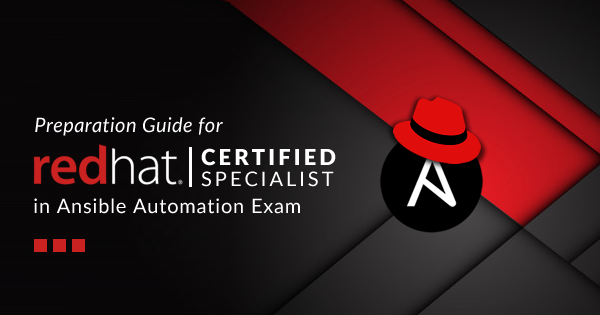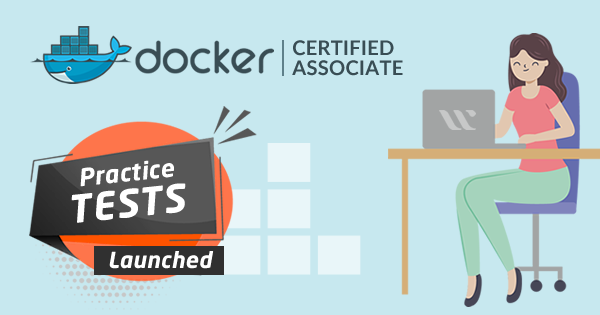Ansible is one of the prominent advancements in the IT automation landscape, and so the demand for an Ansible certification is increasing. Many IT professionals have to cope with the consistent rise in demands for digital transformation. At such a time, the Red Hat Certified Specialist in Ansible Automation certification can be the ideal career tool. Nowadays, organizations do not rely on buying software and tend to develop their apps for maintaining a competitive advantage.
According to Gartner, running a business on the digital front deals basically with software.
Therefore, software delivery should be one of the foremost and improved competencies of an enterprise to sustain competitive advantage. Ansible is one of the contemporary automation tools that has provided simpler and hassle-free management of systems and applications. Now, you don’t need any management vendors or scripting solutions for managing software stacks on servers.
Enroll now for the Ansible basics online course to clear your basic concepts and get ready for the Red Hat Certified Specialist in Ansible Automation exam.
Ansible can help you deal with multi-tier applications across different cloud platforms. As a result, the demand for certified Ansible professionals is increasing with every passing day. The following discussion focuses on one of the important certifications for Ansible, the Red Hat Certified Specialist in Ansible Automation.
The discussion would cover important information related to the exam, prerequisites for the exam, and the target audience. Furthermore, the discussion would also focus on the objectives of the certification exam. Most important of all, the discussion would highlight steps for Red Hat Certified Specialist in Ansible Automation exam preparation. So, without any further ado, let’s start!
Red Hat Certified Specialist in Ansible Automation Certification
The first aspect of this discussion on the Red Hat Certified Specialist in Ansible Automation certificate exam includes basic information. The basic information should involve an overview of what the exam is actually. The certificate is suitable for IT professionals that can demonstrate skills, abilities, and knowledge for using Ansible. The individuals should show abilities for automation of system management and deploying them in an enterprise environment.
Any candidate preparing for this certification exam should understand the importance of complying with the Ansible best practices. Furthermore, the certification is an ideal instrument for showing your skills in Ansible automation for different functionalities. Most important of all, it would also allow efficient scaling of infrastructure.
Read Now: Chef vs Puppet
The Suitable Audience for the Exam
Now, the next important concern in this discussion on Red Hat Certified Specialist in Ansible automation is the audience. You should know exactly whether the exam is right for you or not. So, is this certification right for everyone? Not! You should go for this certification only if you fulfill certain roles.
- System administrators with aspirations to manage multiple systems can opt for this certification. Furthermore, a system administrator working in DevOps environments and with a desire for automating a large share of your daily workload are ideal candidates.
- Not only system administrators, but developers could also try out this certification for promising career benefits. Developers with foundation-level experience in systems administration and desire for incorporating automation in the development process can choose this certification.
- Most important of all, if you are already a Red Hat Certified Engineer (RHCE) and you want to earn another certification, then you can go for this certification. Recommendations suggest that RHCE professionals interested in achieving a Red Hat Certified Architect (RHCA) certificate can apply for this certification.
Also Read: Advantages and Disadvantages of Ansible
Examination Pattern and Format
The next highlight for Red Hat Certified Specialist in Ansible automation exam preparation refers to information about the exam format. The exam depends on performance-based evaluation of the candidate’s ability to use Ansible. Candidates will find questions citing real scenarios involving the use of Ansible for automating application deployment and system configuration.
In a way, the certification exam helps in evaluating the capabilities of candidates for addressing tasks like in real jobs. The Red Hat Certified Specialist in Ansible automation exam would test candidates based on specific objective criteria. For instance, we can have to develop Ansible playbooks for system configuration by specific roles. You can also be asked to apply playbooks to different systems for implementing specific roles.
Furthermore, you can also find questions asking to showcase your skills in running Ansible playbooks and configuring Ansible environments. The total duration for the certification exam is four hours. Candidates can appear for the exam in three different formats, such as classroom exams, on-site exams, and individual exams.
Check out the table below for exam information:
Red Hat Certified Specialist in Ansible Automation Exam Information |
|
|
Exam Name |
Red Hat Certified Specialist in Ansible Automation certification exam |
|
Exam Code |
EX407 |
|
Exam Duration |
4 Hours |
|
Exam Format |
Hands-on practical assignments |
|
Number of Tasks |
10 to 15 performance-based tasks |
|
Exam Fee |
$400 (Plus taxes) |
|
Platform |
Red Hat® Enterprise Linux® 7.5 and Ansible 2.7 |
The official registration fee for the certification exam is not clear. However, the candidate could access the official contact information on the certification page to find out the registration fee. Most important of all, the official certification page on Red Hat is an ideal source for clearing any doubts related to exam information.
Candidates should also note information about scores of the Red Hat Certified Specialist in the Ansible automation certification exam. Officially, the score for the exams publishes exclusively on Red Hat Certification Central. Candidates cannot get results directly from examiners or training partners. Generally, you can find the scores within 3 US business days after the exam. Furthermore, the exam results are shown as total scores without any details on performance in specific areas of the exam.
Exam Objectives
The most prominent highlight in the preparation guide for the Red Hat Certified Specialist in Ansible exam is the exam objectives. The exam objectives we present in this discussion denote the task areas that you will find in the exam. Red Hat has all the rights for adding, modifying or excluding any exam objectives. In case of any changes, Red Hat would make them public in advance. The exam objectives for the Red Hat Certified Specialist in Ansible automation exam are as follows.
- Understanding the core components of Ansible like inventories, variables, playbooks, modules, facts, plays, and configuration files.
- Running ad-hoc Ansible commands.
- Use of static and dynamic inventories for defining groups of hosts.
- Creation of Ansible plays and playbooks.
- Creation and use of templates for the creation of customized configuration files for hosts.
- Working with Ansible variables and facts.
- Creating and working with roles.
- Management of parallelism.
- Utilizing Ansible Vault in playbooks for safeguarding sensitive data.
- Configuration of external authentication.
All these exam objectives are an inevitable part of any Red Hat Certified Specialist in Ansible automation study guide. You can find the further expansion of the domain about the creation of Ansible plays and playbooks. Under the exam objective of creating ansible plays and playbooks, you will learn the following topics.
- Understanding approaches for working with commonly used Ansible modules.
- Using variables for retrieving results of running commands.
- Using conditionals for controlling the execution of plays.
- Configuration of error handling.
- Creation of playbooks for configuring systems for a particular state.
Candidates should also focus on another important component in the Red Hat Certified Specialist in Ansible automation study guide. The exam objective of using Ansible Vault in playbooks includes the following topics.
- Installation of Ansible Tower.
- Use of Ansible Tower for system management.
- Configuration of role-based access controls (RBAC).
Ansible is one of the top DevOps tools. If you want to know about other best DevOps tools, check out our previous article – Top DevOps Tools List.
Preparation Guide for Red Hat Certified Specialist in Ansible Automation Exam
The most important part of our discussion on the Red Hat Certified Specialist in Ansible Automation exam is the preparation guide. The preparation guide would focus on essential steps that can help candidates prepare effectively for the final exam.
-
Go for Red Hat Recommended Courses
The foremost recommendation to prepare for the Ansible Automation specialist certification exam is the official Red Hat training course. You can find the training course “Automation with Ansible” with the code name DO407. The exam is ideal for Linux system administrators and developers who need automation of provisioning, application deployment, and orchestration. The DO407 course is the standard training course in preparation guide for Red Hat Certified Specialist in Ansible exam.
-
Enroll for Online Training Courses
The next step in your preparation could involve online courses by online training providers. These certification training providers have the reputation of helping many candidates achieve certifications. The elaborate discussion on the course content, as well as the relevance of the online course with exam objectives, is commendable. Also, you can get the advantage of learning from subject matter experts and certified professionals on these platforms.
-
Don’t Forget to Take Practice Tests and Flashcards
The most crucial part of your preparation should be practice tests and flashcards. Both of these can help you improve your confidence to appear for the real examination. Also, you can avail of the benefit of solving questions that can improve your knowledge of Ansible. However, the best advantage of practice tests is the understanding of your strengths and weaknesses in the subject.
-
Participate in Discussion Forums and Study Groups
Finally, candidates should also become team players and involve completely in discussion forums and study groups. The Ansible community is also a great place to learn new things and clear your doubts at the same time. The practice of community learning could contribute essentially to a rise in your confidence. Most important of all, having the whole community supporting you is a definite improvement.
Preparing for an Ansible interview? Go through these Top Ansible Interview Questions and make yourself fully ready to crack the interview.
Final Words
The most important element in your preparations for the Red Hat Certified Specialist in Ansible Automation is your dedication. There are no specific prerequisites for attending this certification, and this makes the exam a lot more interesting. You should also note that the exam objectives will continue to change since Ansible is an opensource tool.
So, constant involvement with the Ansible community is a mandatory prerequisite for every candidate. The future direction of candidates should involve a comprehensive plan and someone to hold them accountable for it. Finally, you need to keep in mind that it is just an examination and you don’t need to stress too much about it. Start with the Ansible basics online course, prepare well and pass the exam with flying colors!
- Top 10 Highest Paying Cloud Certifications in 2024 - March 1, 2023
- 12 AWS Certifications – Which One Should I Choose? - February 22, 2023
- 11 Kubernetes Security Best Practices you should follow in 2024 - May 30, 2022
- How to run Kubernetes on AWS – A detailed Guide! - May 30, 2022
- Free questions on CompTIA Network+ (N10-008) Certification Exam - April 13, 2022
- 30 Free Questions on Microsoft Azure AI Fundamentals (AI-900) - March 25, 2022
- How to Integrate Jenkins with GitHub? - March 22, 2022
- How to Create CI/CD Pipeline Inside Jenkins ? - March 22, 2022



